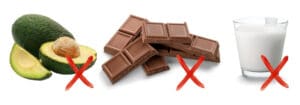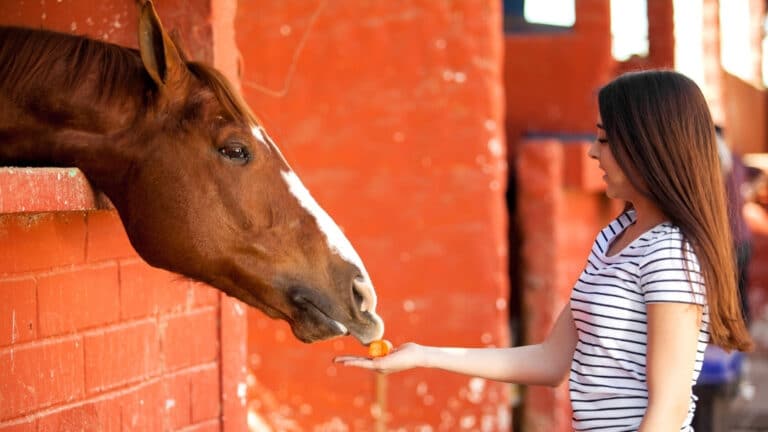When it comes to feeding your horse, you no doubt are going to want to provide a healthy and balanced equestrian diet that not only satisfies your horse’s energy requirements but also promotes growth and development.
As with all things horse-related, some important factors will need to be considered before dishing out the culinary goods to your equestrian friend.
What NOT to feed your horse
Knowing what foods to steer clear of can save you money and suffering should you unknowingly poison your beloved companion. There are a range of foods that are toxic or contain toxic components to equines, so you should always know your facts about feeding.
Just like dogs and cats, horses cannot eat chocolate or avocado. These two foods are toxic due to containing Persin and Theobromine. Persin is present within avocados, and when fed to horses, poses the risk of causing colic, respiratory complications, irregular heartbeat, neurological dysfunction, and possibly can be fatal. Chocolate contains Theobromine, which is known to cause seizures, increased heart rate, muscle tremors, diarrhoea, and in some cases, internal bleeding. Aside from Theobromine, chocolate contains caffeine, which has been known to show up in drug testing, which is not ideal if you intend on racing your horse or competing in competitions.
As horses are herbivores, meat is generally a food group you want to eliminate from their diet from the get-go. Due to being herbivores, the livers of equines cannot rid themselves of meat residue, and despite no long-term problems, it just makes sense to avoid feeding them meat due to their herbivorous tastes and teeth.
Bread and dairy products should also be avoided where possible. Bread is not toxic to horses but contains very little nutritious value and can be known to cause calcium deficiency due to the high levels of phosphorus and starch. Dairy products on the other hand should be avoided at all costs. Horses are lactose intolerant, meaning their digestive system is not able to process dairy as humans, or many other animals can. Feeding your horse dairy products such as yoghurt, cheese or milk can cause concerning gut problems for your horse, so do your best to keep the ice cream to yourself!

Feeding equines fruit and vegetables
Although horses love fruits and vegetables such as carrots and apples, there are certain types of vegetables you should avoid feeding your horse altogether, with the main four being: Tomatoes, Onion, Garlic and Potatoes.
Although most equines aren’t a fan of the taste of potatoes, chances they might be feeling adventurous and have a try are high, which is why it is important to keep potatoes out of reach. Potatoes, as well as tomatoes, belong to the nightshade family, a toxic plant type for equines. Although raw potato is much more toxic than cooked potato, it is advised to keep both out of your horse’s diet and ensure no potato plants are growing within your horses reach, as the stem and leaves of the potato plant are also highly toxic.
Tomatoes, as mentioned above, are part of the nightshade family and include tomatine and atropine, with the plant itself containing alkaloids. Feeding tomatoes to your horse can cause a variety of digestive problems as well as reduce saliva levels. Alkaloid also slows gut function, so it is best to avoid tomatoes and plant them in a secure area where your horses are not able to access them to avoid unsolicited snacking on these juicy red berries.
Garlic is known globally for its natural antibiotic properties and immune-boosting powers, but many are unaware that frequently feeding equines Garlic within their daily diet is doing more harm than it is good. Vegetables such as garlic, onion and leek can be toxic to horses due to n-propyl disulphide which is known for destroying the red blood cells in equines. While small amounts of garlic are considered safe, studies commenced such as the 2005 study conducted by Wendy Pearson, suggest offering garlic as a part of a daily diet could be doing more harm than good, with Wendy’s study concluding that 250 grams of garlic fed daily to a 500kg horse caused negative changes to the horse’s blood.

When it comes to choosing delicious and nutritious fruits and vegetables that are safe and conducive, you can count on classic favourites such as carrots, apples and bananas, as well as sultanas, strawberries, melons, celery, peas or pumpkin. Most of these foods are safe to serve raw and uncooked, although some may require cutting into smaller pieces to prevent any impatient equines from being at risk of choking. Cabbages and Brussels Sprouts are generally avoided due to their known ability to cause gas and general digestive discomfort for equines.
Remember that horses like to graze a lot too, so do not give in to their pleading looks or seemingly starving actions and indulge them in numerous treats throughout the day, as hard as it can be!



